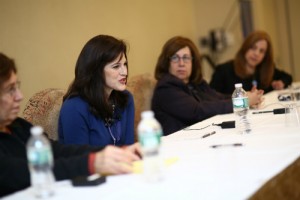 I was reminded of Facebook COO Sheryl Sandberg when I attended the aptly titled, “Bringing Orthodox Jewish Women into the Leadership Table” at the recent Orthodox Union Convention.
I was reminded of Facebook COO Sheryl Sandberg when I attended the aptly titled, “Bringing Orthodox Jewish Women into the Leadership Table” at the recent Orthodox Union Convention.
In December 2010, Ms. Sandberg delivered a landmark address at a women’s leadership summit. She told a story of a meeting with United States Treasury Secretary Timothy Geithner, whose four female staff members sat off to the side of the room instead of sitting around the large conference table. Sandberg noted that because of their seating arrangement, they seemed more like spectators than participants. She appealed to her audience that millennial women must feel comfortable taking a seat at the table in order to advance women’s leadership.
The panelists echoed similar sentiments to the challenge that Ms. Sandberg had talked about. “When we’re the women, how can we make sure that we can expect a seat at the table? That we invite ourselves to the table?” asked Dr. Marian Stoltz-Loike, dean of Touro’s Lander College for Women/The Anna Ruth and Mark Hasten School at the panel.
Addressing the issue at hand, Nishmat’s Founder and Dean Rabbanit Chana Henkin championed the importance of advanced Torah learning. Dr. Rona Novick, Dean of the Azrieli Graduate School of Education and Administration at Yeshiva University echoed similar ideas to Sandberg’s magnum opus “Lean In,” including seeking mentorship; speaking up at board meetings; and not underestimating one’s confidence and capabilities.
Watching this panel caused me to reflect on my own educational background and views on women’s leadership in the Jewish communal and professional spheres.
In the modern Orthodox girls high school I attended, the prevailing attitude was to go out there and make a difference in the world as leaders. Academic achievement in preparation for fields such as medicine was encouraged by establishing a Science Institute. Model UN, Model Congress, and debate team appealed to aspiring lawyers and advocates. Gemara was offered as option of study in lieu of Halacha (which even so was heavy on text-based sources). Since I have graduated, Gemara became a mandatory subject. In my twelfth grade English class we read feminist literature such as Herland by Charlotte Perkins Gilman, Kate Chopin’s the Awakening, and A Doll House by Henrik Ibsen.
Very little discussion, aside from senior lecture week, was devoted to learning how to run our future homes. Quite the contrary. For Purim skits, teachers and students alike laughed out loud as the actresses with head scarves and stuffed bellies proclaimed mockingly that their goal in life was to stay at home with the children and making the perfect potato kugel. I laughed too, but something inside made me shift uncomfortably in my seat.
Friends and classmates from seminary and college who attended other high schools stressed their schools emphasized more traditional women’s roles in the home. Though some of these schools offered similar academic opportunities as my high school alma mater, the message emphasized was that although if one wished she should receive the appropriate education to achieve success in the professional realm, the pride of Jewish women rested in their primary roles as wives and mothers. “When you educate a man, you educate an individual. When you educate a woman, you educate her entire family,” read the slogan of one high school refrigerator magnet I have seen.
While some thought this idea was a prudent attitude reflecting the realities of each gender’s natural roles in ensuring a successful family, not all agreed. “I don’t want to be told that my main goal in life is to help my own children, I want to go out there for fulfilling work to serve other families besides my own. And besides, home baked cookies made of love taste no different than bought ones, they both taste the same,” opined Riva (not her real name), a graduate of such a school.
Through informal conversations and late night discussion with friends, I found that the career choices of the majority of the Orthodox millennial women I knew were influenced in some way by how they want to raise their future families..
“Perhaps medicine would be tempting but not the years of schooling it requires if one wants to start her family by her early twenties,” shared a friend of mine who now works in a technology firm.
After being a full-time stay-at-home mother of four children for thirteen years, my own mother, a nutritionist, returned to the workforce when my youngest sister entered preschool.. She encouraged my passion for writing as a possible career choice because of the flexibility it would potentially offer.
I would love to conduct a survey on Orthodox high school graduates to see where they ended up in terms of career years later. How many of these women married? How many became full-time or part-time working professionals, or were they devoted full-time to family and communal responsibilities?
As I reflected on these questions while listening to each of the convention’s panelists, I wondered whether conversations like these will have a lasting impact on women in the Orthodox community in light of the shift in attitudes in general society and how they shape different circles throughout the Torah-observant community.
Chani (Anne) Neuberger, Chief Risk Officer for the National security Agency, explained, “Women in the Orthodox community feel that they have a way to contribute their talents, feel they’re welcome to contribute their talents, and [that] the community can benefit from that across the spectrum. Women often have a perspective on some social issues in the community…Since women often deal with these issues more, they can bring those perspectives to community discussions, to help the community make progress on addressing important issues.”
As I leaned in to listen, I couldn’t agree more.
The words of this author reflect his/her own opinions and do not necessarily represent the official position of the Orthodox Union.